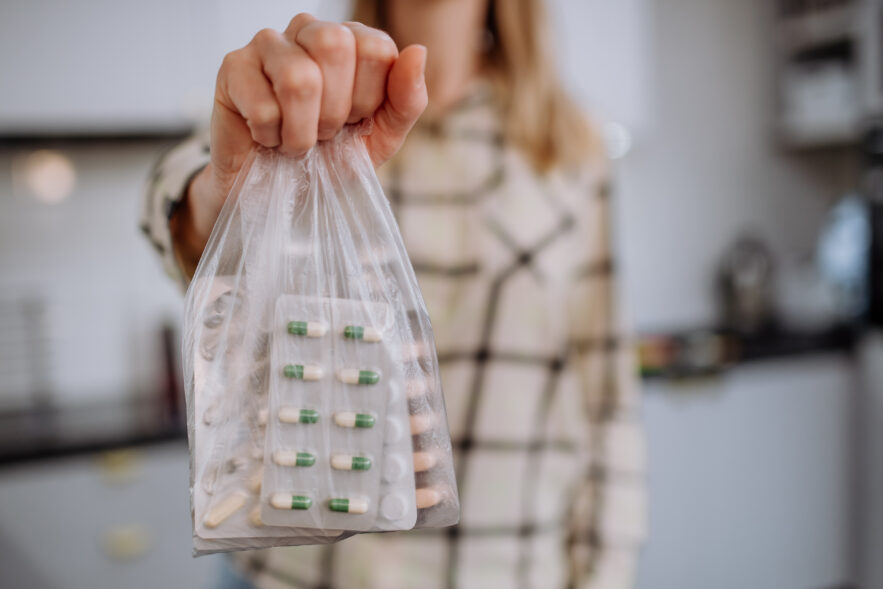[T]ired of promising yourself that, this year, you’ll really go to the gym? Or stop eating desserts? Or any of the other actions you should do or not do? Here’s a new one for you — you’ll feel better, and it’s easy!!
Clean out your medicine cabinet! Really. Right now. Pull out those “nearly finished” prescriptions, that partially-unwrapped roll of Tums, those multi-symptom cold and flu meds, an almost-empty bottle of Pepto-Bismol, and the multiple boxes of Lactaid. Consider these your ghosts of Christmas Past. These are the indicators of how well you are taking care of yourself and your family in the years gone by.
Many of our daily aches and pains, and some of our chronic conditions, can be eliminated or minimized by identifying what caused it. And common drugs found in every pharmacy can create side effects of their own (think antihistamines leading to low blood pressure levels and increased heart rate, or NSAIDs and painkillers like Tylenol causing gas, bloating or heartburn). This puts you at risk for taking a heartburn drug to calm the effects of a Tylenol!
Here’s your common-sense guide to minimizing the need for drugs in 2024. Remember, I’m not a doctor, if you have any questions about necessary drugs, check with your doctor or pharmacist.
1. Do throw out any OTC sinus relief meds and cough drops, they don’t work. Don’t throw out expired drugs. Most are fine for years after expiration – but if it’s a drug that needs to be at full potency for your safety (insulin, epi-pen, for example), keep those up-to-date.
2. Pick up each over-the-counter drug, one at a time, and think back to how many times you used it this year. Once? Twice? Put it back on the shelf. Everyone overeats or has a bowel malfunction once in a while.
Do you use that med every few weeks? More? With some reflection and small changes you may need that drug much less often. For example, are you on your third bottle of Aleve or Tylenol this year? What’s causing all those headaches? If they are stress headaches, you can try water, forest bathing and other stress. Are you downing Dulcolax as if they are gummy bears? Maybe you could use more fiber in your diet.
Water – Drinking more water can help constipation, slow overeating and stop headaches, and more
Exercise – may lower your need for diabetes meds, high blood pressure, insomnia, and more
Nutrition – addresses headaches and many other symptoms.
3. Many times, symptoms like rashes, headaches, dizziness, nausea, diarrhea, insomnia and even anxiety might possibly be side effects of the drugs you’re taking. Suspect prescription meds in your medicine cabinet first (they are typically more powerful than over-the-counter drugs) and ask your doctor or pharmacist if frequent symptoms might be a side effect. The doctor will likely be able to change the drug causing the problem. Or maybe you don’t even need that drug anymore. It’s worth checking! Any time you use a medicine, read the label to find out the side effects so you know when you have one and how to avoid it in the future.
4. Separate all of your prescription bottles into active use and leftovers. We all have that tube of rash cream from the dermatologist that we can’t remember what it was for or some aging Paxlovid from Covid. Thoughtfully dispose of the leftovers (don’t just toss them in the garbage or in the toilet). Here are some ideas of how to safely get rid of meds.
Definitely get rid of leftover anxiety meds, antibiotics, and pain meds. These are dangerous in the hands of children and young adults. They should only be used by the person to whom they were prescribed and for the shortest period of time possible.
5. Organize any remaining prescription bottles into groups by condition: insomnia, diabetes, asthma, etc. What’s your resolution here?
Sleep through the night? Try a wind-down routine before bed and meditation
Use fewer arthritis drugs? Look here for foods and and non-drug strategies
Cut back on anxiety meds? Take a daily mental health walk, try therapy, sleep
Manage depression? Check your gut health and dance (movement therapy)
By the end of this very short exercise, your medicine cabinet should be much emptier and more supportive of your health. When I did this, I threw out sticky old cough drops, my four-year-old cold and flu liquid (drugs past their expiration date), and that odd tube of rash cream (what was that for?). I kept the sinus wash, one ibuprofen bottle, one acetaminophen bottle, one fizzy antacid, and our wound care ointments and bandages. I look at this sparse collection with pride as a sign of good health. Here’s hoping that next year it will be this empty again!






